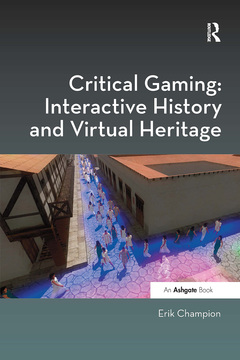Critical Gaming: Interactive History and Virtual Heritage Digital Research in the Arts and Humanities Series

Date de parution : 06-2024
15.6x23.4 cm
Date de parution : 09-2015
15.6x23.4 cm
Mots-clés :
Virtual Heritage; Virtual Heritage Projects; Vice Versa; Virtual Heritage Environments; Grand Theft Auto; EEG Cap; Knowledge Acquisition; Real Time Rendering Engines; Game Engine Source; Historical Simulations; IGD; Star Trek Holodeck; Virtual Environment; Digital History; Digital Heritage Projects; Game Engine; Digital Heritage; Procedural Rhetoric; Chess; BDI Agent; Digital Humanities; Interactive Digital Entertainment; Wild Divine; Played Back; Hero’s Journey



